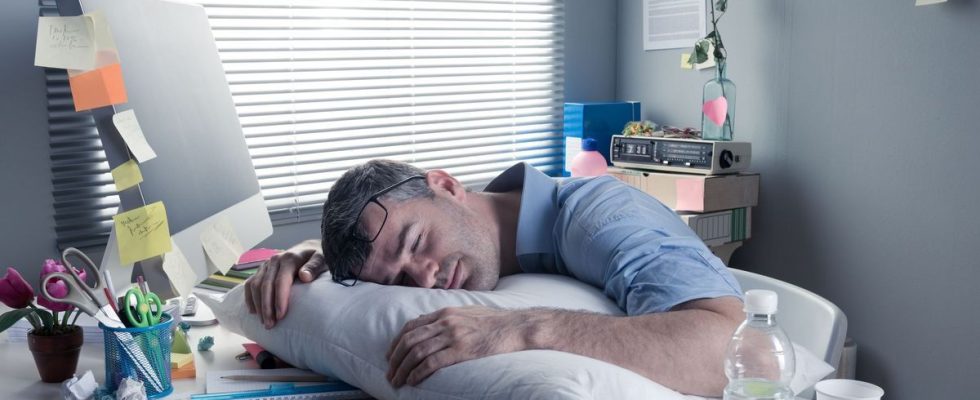Published on
Updated
Reading 2 min.
While it is fashionable to take a nap on vacation, it is much more frowned upon to snooze at your workplace. However, many employees admit to regularly taking small naps during their office hours, as revealed by a recent American survey.
A third of the 1,250 full-time employees surveyed by the Sleep Doctor platform say they take a nap every week during their working hours. It must be said that the idea of dozing off for a few minutes, after lunch or in the middle of the afternoon, before working hard for the rest of the day is particularly attractive.
Napping, easier to do while teleworking
The temptation is all the greater when you work at home, far from the disapproving gaze of your colleagues and superiors. It is therefore not surprising that teleworkers are more likely than their in-person colleagues to take a nap during their office hours. The average duration of these naps is around 60 minutes in their case, compared to less than 15 minutes for employees working on site.
Some employees are more likely than others to squeeze in a nap during their work hours. This is why 52% of the men interviewed for the purposes of this survey said they occasionally snooze at work, compared to only 38% of women. Furthermore, more people aged 18-34 take a nap during their working day than their older colleagues.
Consult a doctor online for your sleep problems
An activity with multiple virtues
There are several reasons why workers take a micro-nap between two files. The first concerns lack of sleep. Most working people “nap” to make up for their sleep debt, or to store up energy for the rest of their working day. Americans usually call these restorative naps “power naps”, to use an expression coined by Harvard researchers.
However, not all employees take a nap during their office hours to improve efficiency. 32% of respondents take refuge in the arms of Morpheus in reaction to the stress they feel in their professional daily life, and 11% out of boredom. Indeed, naps are not only for people who don’t get enough sleep at night. Daytime rest has been proven to promote memory and concentration. It would also strengthen the immune system, reduce stress levels and improve mood. It would therefore be a shame to deprive yourself of its many benefits because of what people will say.
However, if the virtues of the nap are unanimous, this activity still remains taboo in the workplace. Companies have set up nap rooms (or “siesterias”) so that their employees can recharge their batteries in good conditions, but they remain in the minority. The vast majority of employees doze off on makeshift beds, trying to be as discreet as possible.
For good reason, some managers take a dim view of their employees taking a few minutes of rest. But they rarely sanction them for this. Only 20% of people surveyed by the Sleep Doctor platform were sanctioned for taking a nap during their working hours. Among them, 24% were suspended and 17% dismissed.
